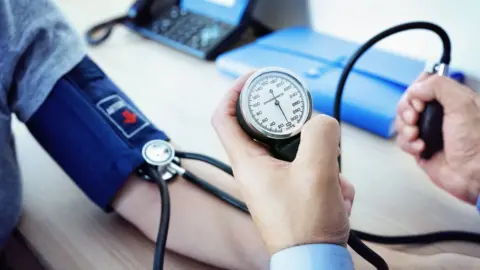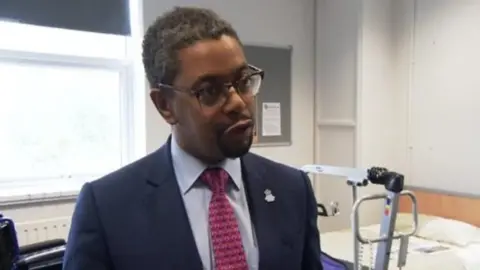Wales tops England on NHS doctors' and dentists' pay deal
 Getty Images
Getty ImagesDoctors and dentists in Wales will get a more generous pay deal than those in England, it has been announced.
Health Secretary Vaughan Gething has accepted all the recommendations of the professions' pay review body and the rise will be backdated to April.
It means all those on salaries will receive a base pay increase of 2%, with further rises for some doctors.
In July the UK government announced more limited pay rises for doctors and dentists in England.
The Review Body on Doctors' and Dentists' Remuneration (DDRB) recommended pay rises of:
- 2% for all dentists and doctors, including consultants
- An extra 2% for GPs
- An extra 1.5% for doctors working in specialisms, who are not consultants and not in training
In England, the UK government announced in July it would give a one-year pay rise of 1.5% for consultants, 2% for trainees, 3% for specialty doctors and a backdated 2% for GPs.
The Scottish government last month announced a backdated pay rise of 3% for salaried doctors and dentists who earn less than £80,000 a year.

Mr Gething said the deal in Wales "goes beyond what was agreed for doctors and dentists over the border".
He added it is "yet another reason why Wales is a great place to train, work and live".
"We have committed additional funding to fulfil the DDRB recommendations," he said.
"The reality remains, however, that our budgets are limited and so meeting a pay deal resulting from the lifting of the UK government's pay cap without appropriate funding to follow presents a risk to the future funding of NHS Wales."
Dr David Bailey, chair of the Welsh Council of the British Medical Association, said the pay rise would go "some way towards addressing" recruitment and retention challenges in Wales.
"Whilst the DDRBs recommendations could have gone further to address many years of below inflation rises, doctors in Wales will be pleased," he added.

Analysis
By BBC Wales health correspondent Owain Clarke
It's well known that there are severe shortages of doctors in parts of Wales.
For example, we consistently hear of GP practices having to close or be taken over.
We know health boards are having to pay a premium for temporary staff to keep some hospital services running.
Mr Gething will hope this pay offer - along with other initiatives - will help tip the balance in favour of Wales, to persuade more doctors to come or stay here.
But it is a risk.
Spending more on salaries means spending cash that could been used on other things.
And in being more generous than England, the Welsh Government has to find more of that money from its own overall budget.
